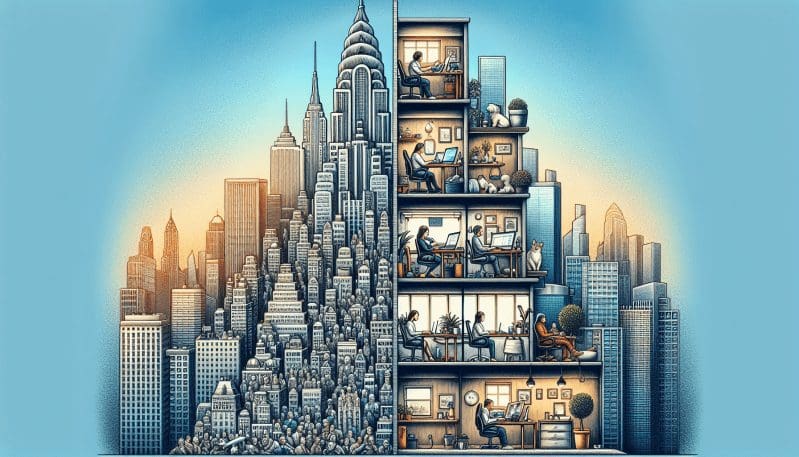In the heart of New York City, where towering skyscrapers once buzzed with the incessant activity of corporate life, a new silence is settling in. The streets, once a tidal wave of suits and fast-walking professionals, now witness a new, quieter rhythm. This change, largely brought on by the global rise of remote work, casts a profound question over the city: Is the inherent corporate culture of the Big Apple being eroded by this seismic shift towards digital nomadism and remote lifestyles?
The traditional New York City work ethic, with its long hours and the iconic hustle, is facing an unprecedented challenge. Employers and employees are renegotiating the terms of the workplace, with many questioning the need for a physical office at all. This reevaluation is more than a mere preference shift; it’s a revolution in the making. Employees, empowered by digital technologies that untether them from their desks, are increasingly opting for remote work—redefining the concept of productivity and flexibility in their professional lives.
The decline of ‘office culture’ is palpable. The camaraderie and spontaneous collaboration that once defined office life are being traded for Zoom calls and Slack channels. While some mourn the loss, others celebrate the rise of a new work-life balance, more attuned to individual needs and less to corporate expectations. This new dynamic is not without its casualties, notably the businesses that catered to the daily flux of office goers—from the corner delis to the dry cleaners, these local economies are feeling the pinch as their customer base dwindles.
Meanwhile, the skyline’s giants—the vast expanses of commercial real estate—are in a state of flux as well. Landlords and developers are scrambling to repurpose gleaming office spaces into apartments, hotels, or co-working spaces, a testament to the changing demands of the city’s population.
To understand the depth of this transformation, we’ve spoken with traditional businesses finding themselves on shaky ground, struggling to adapt to a workforce that is no longer tethered to their locales. We also sought out the thoughts of those at the vanguard of the remote work wave—companies that have done away with the office altogether, embracing the digital nomad lifestyle and finding new ways to maintain their corporate culture and team cohesion from afar.
What emerges from these conversations is a tale of two cities: one fighting to preserve the legacy of a bygone era, and another embracing the future of work with open arms. The question of whether remote work is eroding NYC’s corporate culture is complex and multifaceted. But one thing is clear—the workplace has evolved, and New York City, in its indomitable spirit, is sure to evolve with it.
As The Work Times, we recognize the gravity of this evolution and are committed to chronicling it every step of the way. We continue to explore what the future holds for businesses and workers alike, providing a balanced, in-depth perspective on this modern-day metamorphosis. Stay tuned for more stories, interviews, and insights as we navigate the shifting landscape of work, worker, and workplace in the Big Apple.



























